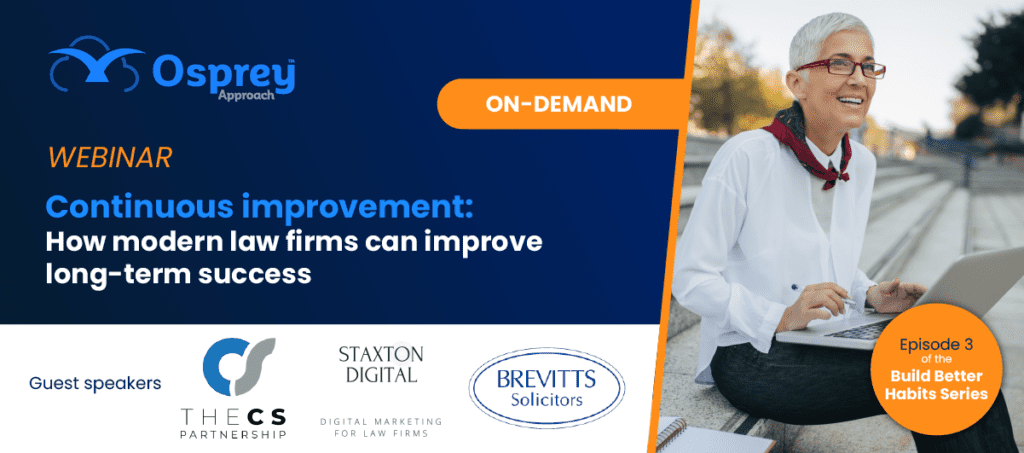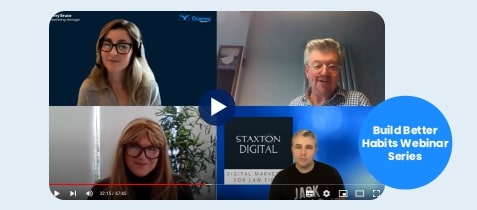Contents
Law firms: stay competitive with a continuous improvement mindset
For episode three of the Build Better Habits webinar series, we were joined by Sarah Keegan, co-owner at The CS Partnership, Laurence Sutton, practice manager at Brevitts Solicitors, and Rich Dibbins, owner at Staxton Digital. Our expert panel shared their practical tips and advice on how law firms can successfully implement a culture of innovation to stay competitive and improve long-term success.

What does a ‘continuous improvement’ mindset mean?
We begin by asking our panellists what a continuous improvement mindset means for modern law firms, and they all believe it is about optimising for the future. The panellists discuss having an operational strategy and internal goals that guide the continuous improvements and innovation across the firm.
Laurence explains that “continuous improvement isn’t just about being up to date, but ahead of the game. [A firm must] be engaged in the practical process of change and the impact it’ll have on what you do.”
Sarah continuous by highlighting that it’s the small changes over time that have the biggest impact. “Concentrate on eliminating [being] busy for busy sake. It’s about the little changes, the one percent change that’s continually repeated will bring change.” Laurence agrees and adds, “it doesn’t have to be elegant; [change] can be simple and straightforward.”
Rich recommends understanding which improvements will have the biggest impact on your firm, “…there’s always something new to implement, but continuous improvement is about looking at things that will work for you and not looking at all the shiny new things and trying to implement them all.”
Why should law firms adopt a continuous improvement mindset, and what problems could occur if they don’t?
A continuous improvement mindset helps law firms to overcome key legal sector challenges including hiring and retaining top talent, risk management, personal indemnity insurance (PII) rising costs, and increasing client expectations.
Sarah starts by highlighting the impact the pandemic had on how UK law firms should operate. “The pandemic caused a massive change to how we communicate. The world is changing, and law firms need to pay attention because their staff and clients are part of that environment, and they expect change.” Rich agrees and continues, “the modern purchaser of legal services lives in a digital era. Clients and new hirers want a modern way of working.”
Laurence reflects on the opportunity that the pandemic provided, saying it created an opportunity to review and examine everything. “So, I now try to recreate that disruption naturally, without the same pressures, to get the team into the mindset of continuous improvement and it’s really worked. Creating a bit of disruption helps us focus on how we could do things better. We’ve tried things that haven’t worked, but we’ve tried things that really work and had us questioning, ‘why have we been doing it like this for so long?’ If you don’t create that mindset, that is the big risk.”
Sarah believes continuous improvement is how law firms can mitigate risk. “Risk is growing exponentially. We are being more regulated as a profession than ever before, so that needs to be reverse engineered into your processes, procedures, technology, and how you report on data. So, if you’re inspected by your regulator, or any auditors, you’ve got the details to hand. This is something that needs to be taken seriously by law firms.”
Laurence discusses the benefits of technology for reducing risk, “when you automate, prescribe, and pre-supervise processes to enable standardised operations you reduce mistakes. Digitalisation, and Osprey, have improved the quality of our standards. The quality was there before, but it was hard work!”
Rich states that continuous improvement does two things, “it will future-proof your firm and it’ll make it more appealing to someone who wants to buy or merge with your firm.” The mindset will help you better prepare for the future and set you up for success, no matter your goals.
How can law firms successfully implement a continuous improvement mindset?
We ask our panellists for practical advice and best practices for ensuring a continuous improvement mindset sticks throughout a law firm. The resounding response is to ensure clear communication with the team and keep the strategy people focused.
Rich explains, “you can’t force people, you have to influence through storytelling. Demonstrate why they need to do this, how they can do it, and the long-term benefits. It has to be an organic, gradual process.”
The biggest barrier to change is fear of the unknown but making continuous improvement the normal practice in your culture helps the team be more accepting to change. Sarah says, “people are often scared to change. That’s why we start by implementing a change that has an immediate impact- something that takes away a fire. Then everyone relaxes [because they see the positive change].”
Laurence states, “you can’t buy magic, but you can create it. We worked with Osprey to suggest new ways of working. When the team saw the changes come to life, it’s magic. Seeing the positive impact makes them hungry to suggest more.” When the team are involved in the process of innovation, they’re more likely to adopt the mindset as it’ll encourage participation. Laurence continues, “employee empowerment is an important part of continuous improvement. The mindset should be people centered.”
Eight habits law firms should adopt
The panel agree that modern law firms should focus on the following habits when implementing a continuous improvement mindset:
- Make it a priority
Sarah recommends, “making it somebody’s job to lead the mindset. You can’t expect a head of department, for example, who is also carrying an entire workload, to take on the role of continuous improvement – it never works because the client comes first every time.”
Ensure innovation is part of someone’s job title to ensure it’s a priority in the day to day running of the practice.
2. Improve communication
To increase the adoption of any new mindset or process it’s important to have clear communication on the goals and objectives. But, as Sarah states, it’s important to ensure there’s communication across the firm for continuous improvement to have the biggest impact. “You’ll be amazed how many firms will make a change in only one area of the firm. For example, the billing takes three days in one department, but you talk to the family team, and it takes them just hours. And you ask, ‘did you not tell the rest of your partners how you improved this process?’ Always share what is and isn’t working across the firm.”
3. Identify risks
Laurence suggests your continuous improvement goals should prioritise reducing risk, “look at ways to mitigate risk and secure quality so that compliance and case management work efficiently. That should be a habit across the firm.”
4. Empower employees
It’s important to connect your people, processes, and technology for an effective operation. As Laurence explains, it’s empowering your employees with knowledge and freedom that will help promote a culture of innovation. “Engage, empower, and entrust your employees, don’t restrict them. Delegate effectively, give them authority, and hold them to account.”
5. Partner with your tech supplier
Build a reliable partnership with your software supplier to reap the benefits of your investment. Laurence says that it’s important to “build a good relationship with your supplier so you can be in the driving seat, and you can trust they’ll make the magic happen.” Rich agrees and recommends taking advice from external providers and consultants rather than going it alone because they have the expertise and years of knowledge to suggest best practices.
6. Have a clear focus
Rich advises that, “instead of focusing on all the new shiny stuff, focus on the things that work for your firm and double down on it.” It can be easy to get distracted and spend time and money on the latest technology, but it’s important to identify a clear strategy first. Then you can focus on what tools and processes will help you reach those goals.
7. Start with your weaknesses
It can be hard to know where to start with continuous improvement because it affects every part of your firm. Rich advises, “don’t stick your head in the sand by realising your weaknesses and then ignoring them. The biggest weakness for law firms is their reviews… please don’t ignore them; it can be detrimental to your brand.” Take the feedback from your reviews, good and bad, and look to improve your processes from your customers’ perspective.
8. Understand the connection between reputation and brand
Continuous improvement helps you firm stay competitive because it regularly optimises your operations to better meet your goals. Rich emphasises the connection between your reputation and your brand and how important it is to recognise that any client touchpoint can affect how you’re perceived. “Lawyers say they don’t sell, but if you speak to a client, you sell – you’re representing your firm.” So, look to optimise your client touchpoints and that will elevate your brand against the competition.
Implement a culture of continuous improvement for long-term success
This episode highlighted the importance of innovation and optimisation for long-term success. To maximise the value of your software investments, to meet your goals, to mitigate risk, and to satisfy your employees and clients, law firms need to make continuous improvement a priority.
Continuous improvement is an ongoing strategy, not a one-off project, so it’s important that your employees adopt the mindset and practices. To help implement the mindset, empower your employees with clear goals, promote communication and share ideas across departments, and hold individuals accountable for contributing.
Having a continuous improvement mindset is one of four habits that modern law firms should adopt for long-term success. We’ve covered all four habits in our Build Better Habits webinar series, which you can watch on-demand now.





